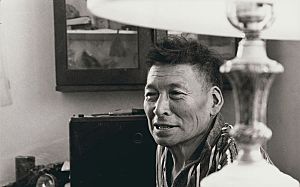Peter Pitseolak facts for kids
Peter Pitseolak (born 1902, died 1973) was a talented Inuk artist. He was a photographer, sculptor, and historian. Peter Pitseolak was the first Indigenous photographer on Baffin Island.
Contents
Life Story of Peter Pitseolak
Peter Pitseolak was born on September 2, 1902. His birthplace was Nottingham Island in the Northwest Territories. He spent most of his life in traditional Inuit camps. These camps were near Cape Dorset on Baffin Island. This area is now part of Nunavut, Canada.
Preserving Inuit Culture
Peter Pitseolak saw many changes happening in the Inuit community. He wanted to keep the old ways of life alive. He did this by writing, sketching, and especially by taking photos. He recorded many things. These included customs, hunting methods, stories, and myths. His brother, Pootoogoo, was a chief.
His Start in Photography
In 1912, Peter met a photographer named Robert J. Flaherty. Flaherty is famous for his movie Nanook of the North. This meeting sparked Peter's interest in photography. However, he didn't take his first photo until the 1930s. He took it for a visitor who was scared to photograph a polar bear. Peter used the visitor's camera to get the shot.
Family Life and Challenges
In 1923, Peter married Annie from Lake Harbour. They had seven children together. Sadly, only two daughters, Udluriak and Kooyoo, survived. Annie passed away in 1939 from tuberculosis.
In the 1940s, Peter lived in Cape Dorset. He worked for fur-traders there. He got his first camera from a Catholic missionary. With help from his second wife, Aggeok (1906-1977), he developed his first photos. They even used a hunting igloo as a darkroom!
Developing photos was hard. They faced extreme weather and bright snow. It was also tough to get film and chemicals. Peter and Aggeok experimented a lot. They used a flashlight covered with red cloth as a safe light. They even made a lens filter from old sunglasses.
Other Artistic Talents
Peter Pitseolak was also a painter. In 1939, he created a series of watercolors. These were for John Buchan, whose father was a Governor General.
He also wrote many diaries and notes. All of his writings were in Inuktitut syllabics. He worked with Dorothy Harley Eber on two books. People From Our Side (1975) told his early life story. Peter Pitseolak's Escape From Death (1977) was about a scary event on the ice.
Documenting a Changing World
Peter took photos of himself, his family, and his community. He captured everyday moments. He also posed people in traditional clothes with old tools. Over 20 years, he took more than 2,000 photos. These pictures show a way of life that was slowly disappearing.
In 1961, at age 59, he moved back to Cape Dorset. After he died in 1973, over 1,500 of his photos were bought. They are now part of the Canadian Museum of History.
His Artistic Legacy
Peter Pitseolak's family also included other artists. The famous sculptor Okpik Pitseolak married Peter's son, Mark Pitseolak. Peter's nephew, Kananginak Pootoogook, was also a great artist. He admired and was inspired by his uncle.
Peter Pitseolak passed away on September 30, 1973, in Cape Dorset.
Gallery
-
Carved soapstone bear by Peter Pitseolak; donated to Royal Military College of Canada on Oct 3 1970 by the class of 1920-4
See also





